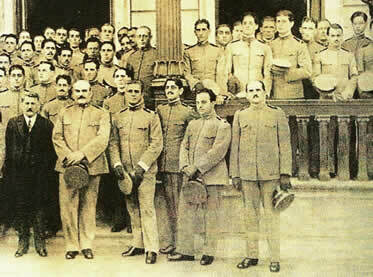The Juazeiro do Norte movement began in 1913, in Ceará, and was a response to the introduction of the policy of salvation prepared by the then President Hermes da Fonseca, who intended to fight the coronelistic leaderships that hindered power public. The most curious thing about this movement was that one of its leaders was the Father Cicero Romao who, in addition to being a religious member of the church, had also become a colonel.
Father Cícero began his religious career in the interior of the city of Crato, Ceará, with the aim of propagating the Christian faith. However, in the 1870s, the priest moved to Juazeiro do Norte where he became the greatest political and religious leader in the region. His influence on society began when he performed a Eucharistic miracle during a mass in which the host given to a blessed turned to blood. After this event, the news spread and the priest came to be seen as a leader messianic, represented as the real Messiah, O savior of the people of Juazeiro.
Doctor Floro Bartolomeu, who arrived in the city of Juazeiro in 1908, signed an alliance with Father Cícero, forming a powerful influence in the region. Furthermore, in 1910, the most powerful colonels in the state of Ceará united, signing a "Colonel's Pact", to fight the politics of salvations introduced by the federal government. After the signing of this pact, Father Cícero declared the city of Juazeiro do Norte to be independent from the municipality of Crato and became, through a halter vote, the city's first mayor.
Do not stop now... There's more after the advertising ;)
Franco Rabelo, governor of the state and an ally of the federal government, decided to intervene militarily in the city of Juazeiro to impede Father Cicero's political growth. However, the religious leader, together with Floro Bartolomeu, had under his power a large amount of jagunços who were prepared to defend the city and who even invaded the state capital, Strength. The result was a war between colonels and the state.
Padre Cícero and Floro Bartolomeu emerged victorious from the confrontation with the State and continued to hold political positions and command the city of Juazeiro with great influence. After Father Cicero's death, several people began to follow him, considering him a true messianic leader, the protector of the northeastern people.
By Fabricio Santos
Graduated in History
Would you like to reference this text in a school or academic work? Look:
SANTOS, Fabrício Barroso dos. "Juazeiro do Norte Revolt"; Brazil School. Available in: https://brasilescola.uol.com.br/guerras/revolta-juazeiro-norte.htm. Accessed on June 28, 2021.


